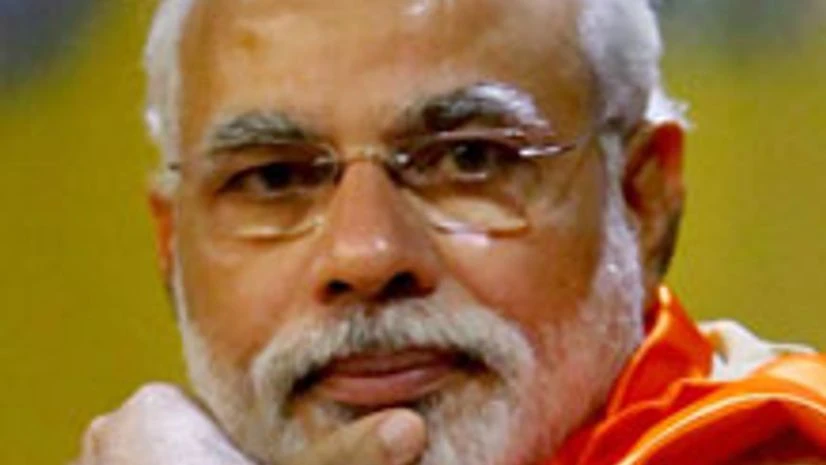Gujarat chief minister Narendra Modi on Thursday called on Rashtriya Swayam Sevaksangh (RSS) chief Mohan Bhagwat who was on one-day visit to Ahmedabad.
Modi met Bhagwat at the RSS headquarter Hedgewar Bhavan here and spent nearly an hour discussing various issue including state and national politics, sources said.
However, an RSS spokesperson later told mediapersons that Modi had come to pay a courtesy visit and this should not be linked with politics. But insiders claimed that Gujarat CM discussed with Bhagwat various issued related of state politics. Modi's meeting assumes significance as it has been alleged that RSS was behind his declaration as BJP's prime ministerial candidate for 2014 general elections.
Earlier in the day Bhagwat had asked members of the organisation to tap the younger generation for propagation on Hindu culture and values. He said that there was huge potential in large population of youth in the country which should be made to understand the ideology of RSS not by mere talks but by setting up examples and practice of traditions.
"The ideology of RSS is not new as if we had invented it. We are not founders of Hindutava, it has been there for ages and is integral part of over culture," Bhagwat said during a function held in Ahmedabad to felicitate three retiring trustees of weekly magazine 'Sadhna' based on RSS ideology.
"What we are talking about is not new, only thing is we are facing new challenges which has to be tackled differently in line with the ideology. The scenarios may be new with new challenges but the direction we need to take remains the same," he elaborated on the saffron outfit's role in society.
He pointed out that there was huge potential in the younger generation which has a large population. "I have experienced that young generation is more attracted to patriotism and we need to tap them. Mere words cannot make difference. They need to be made to understand (RSS ideology) through example," Bhagwat said.
According to the RSS chief, words with out any meaning was of not use. He emphasised on the need to first practice the values of RSS and they propagate it among the youth who could then be more receptive.
Modi met Bhagwat at the RSS headquarter Hedgewar Bhavan here and spent nearly an hour discussing various issue including state and national politics, sources said.
However, an RSS spokesperson later told mediapersons that Modi had come to pay a courtesy visit and this should not be linked with politics. But insiders claimed that Gujarat CM discussed with Bhagwat various issued related of state politics. Modi's meeting assumes significance as it has been alleged that RSS was behind his declaration as BJP's prime ministerial candidate for 2014 general elections.
Earlier in the day Bhagwat had asked members of the organisation to tap the younger generation for propagation on Hindu culture and values. He said that there was huge potential in large population of youth in the country which should be made to understand the ideology of RSS not by mere talks but by setting up examples and practice of traditions.
"The ideology of RSS is not new as if we had invented it. We are not founders of Hindutava, it has been there for ages and is integral part of over culture," Bhagwat said during a function held in Ahmedabad to felicitate three retiring trustees of weekly magazine 'Sadhna' based on RSS ideology.
"What we are talking about is not new, only thing is we are facing new challenges which has to be tackled differently in line with the ideology. The scenarios may be new with new challenges but the direction we need to take remains the same," he elaborated on the saffron outfit's role in society.
He pointed out that there was huge potential in the younger generation which has a large population. "I have experienced that young generation is more attracted to patriotism and we need to tap them. Mere words cannot make difference. They need to be made to understand (RSS ideology) through example," Bhagwat said.
According to the RSS chief, words with out any meaning was of not use. He emphasised on the need to first practice the values of RSS and they propagate it among the youth who could then be more receptive.

)
